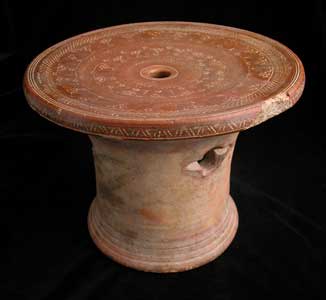Djenne Terracotta Ceremonial Incense Cover, 1200 CE - 1400 CE
Terracotta
8.5
PF.6042
Further images
Jenne-jeno is the site of the oldest known settlement in sub-Saharan Africa, dating from the third century B.C. Many scholars previously thought that complex social organization did not exist here...
Jenne-jeno is the site of the oldest known settlement in sub-Saharan Africa, dating from the third century B.C. Many scholars previously thought that complex social organization did not exist here before the arrival of Islamic traders in the seventh and eighth centuries. However, archaeological expeditions conducted in the 1970’s clearly showed that indigenous trade networks and social structures were in place starting from as early as 200 B.C. The old town of Djenne, Jenne-jeno, is located on an island in the inland Niger Delta of Mali. It was founded in 800 A.D. and at this time already had about ten thousand inhabitants. Between 800 and 1000, Jenne-Jeno was a thriving area, owing to the combination of rich rice-growing soils, levees for pasture in the flood season, deep basin for pasture in the dry season, and access to major river channels and the entire system of inland trade routes. Djenne later became an important Islamic cultural center. After 1400, the town gradually declined, while the present-day Djenne, little more than one mile away, was already founded in about 1250.
The flaring, cylindrical shape of this object is unusual in the body of Djenne art. Holes perforate the sides and the center of the top, suggesting that this work might have functioned as a ceremonial cover for an incense burner. Certainly, this object adopts a mythic power when we visualize smoke pouring forth from its opening. However, both the shape and sturdiness of the work suggest it may have been used as a stool. Yet, to be utilized as a seat, the decorative abstract patterns that cover the top would be hidden from view. Thus, it is unlikely that the artist would exert so much effort to embellish a surface that would not be seen. The fantastic, detailed designs molded in low relief along the “seat” of the object reveal the influence that Islamic geometric motifs had upon the artists and artisans of Djenne. The surface is divided into bands of concentric circles that radiate outward from the central hole. The rich red color of the clay is a hallmark of the Djenne style. The mystery of this unusual work reinforces how little we know about the ancient culture called Djenne. Although we may not comprehend their rich history or mythological traditions, although we may have few clues as to the social structure and lifestyles of the society, we are simply astounded by their artistic sophistication and love of beauty. A work such as this one leaves us with so many unanswered questions, hungry to learn more.
The flaring, cylindrical shape of this object is unusual in the body of Djenne art. Holes perforate the sides and the center of the top, suggesting that this work might have functioned as a ceremonial cover for an incense burner. Certainly, this object adopts a mythic power when we visualize smoke pouring forth from its opening. However, both the shape and sturdiness of the work suggest it may have been used as a stool. Yet, to be utilized as a seat, the decorative abstract patterns that cover the top would be hidden from view. Thus, it is unlikely that the artist would exert so much effort to embellish a surface that would not be seen. The fantastic, detailed designs molded in low relief along the “seat” of the object reveal the influence that Islamic geometric motifs had upon the artists and artisans of Djenne. The surface is divided into bands of concentric circles that radiate outward from the central hole. The rich red color of the clay is a hallmark of the Djenne style. The mystery of this unusual work reinforces how little we know about the ancient culture called Djenne. Although we may not comprehend their rich history or mythological traditions, although we may have few clues as to the social structure and lifestyles of the society, we are simply astounded by their artistic sophistication and love of beauty. A work such as this one leaves us with so many unanswered questions, hungry to learn more.







